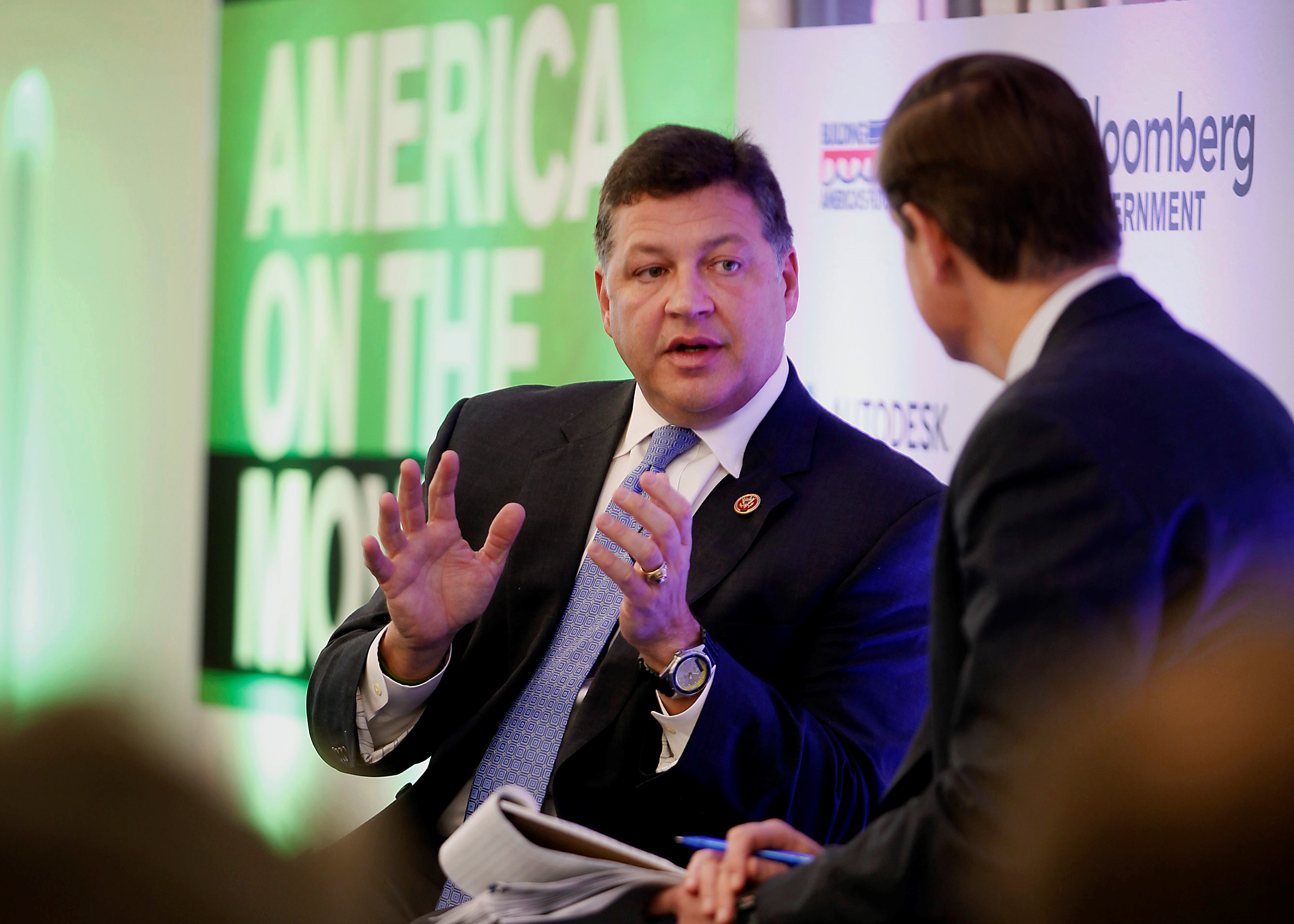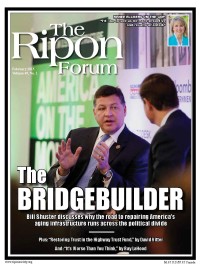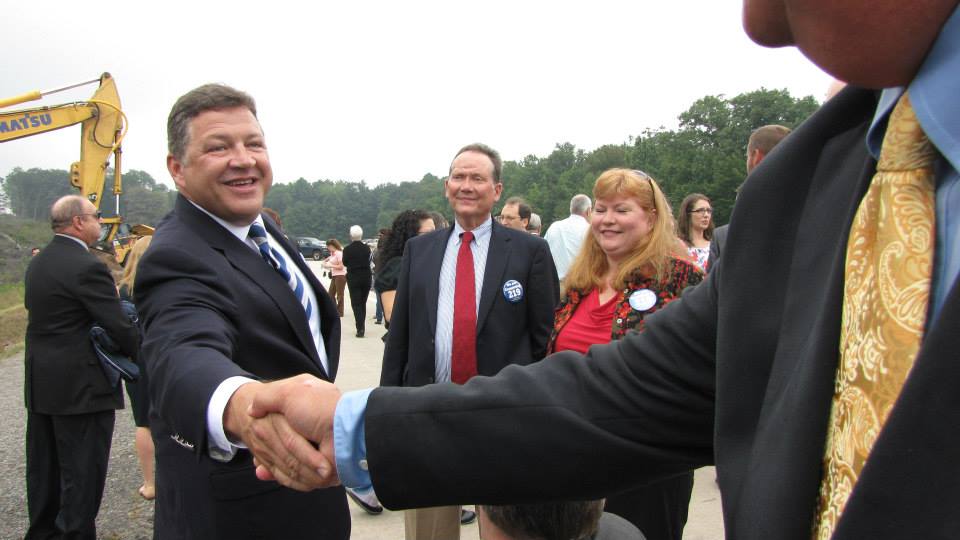Shortly after he was named Chairman of the House Transportation and Infrastructure Committee in November 2012, Bill Shuster called his Democratic counterpart on the Committee with a simple request:
“Let’s have dinner,” the Pennsylvania Republican said to then-ranking Member Nick Rahall of West Virginia. As Politico later reported, the purpose of the call – and the dinner – was to build a relationship between the two leaders of the T&I panel, while setting a tone for the way Shuster wanted the panel to operate in the coming years.
“He’s been — from the get-go — open, transparent, communicates superbly with me,” Rahall was quoted as saying. “And that’s not only on a member-to-member level but trickles to the staff as well. There’s a staff-to-staff bipartisanship that exists.”
Today, Rahall is gone from the Committee – he lost his bid for reelection last November — but the tone of comity and cooperation that Shuster established remains. In fact, he has already had dinner with Rahall’s successor, Peter DeFazio of Oregon. And it is in this atmosphere of bipartisanship that Shuster intends to tackle his toughest challenge yet – passing a long-term funding bill to repair and rebuild America’s aging infrastructure.
If anyone is prepared to meet this challenge, it is the eight-term lawmaker from McKeesport. A businessman before he was elected to Congress and the son of Bud Shuster, the longtime Chairman of the Transportation Committee, Shuster brings to the job an eye for the bottom line and an ear for compromise.
He will need both of those skills — and more — as Congress tries to arrive at an agreement that has proven elusive so far. The FORUM spoke to Chairman Shuster recently about this challenge and the prospects for action this year.
_______________________
FORUM: You’ve got an MBA from American University and worked in the private sector for Goodyear before coming to the Hill. What is the business case for rebuilding our roads and bridges and investing in infrastructure across the United States?
SHUSTER: Time is money, whether we’re talking about the commuter that’s stuck in traffic, or a truckload of goods that’s forced to reroute around a bridge that’s no longer performing to standard. Congestion costs us over $120 billion dollars and nearly 3 billion gallons of wasted fuel. Ten percent of a product’s total cost can be attributed to transportation, so when the system is inefficient, we all pay more for the goods we rely on every day.
Here’s a specific example of the economic importance of good infrastructure. It costs about $85 to transport a metric ton of soybeans from Davenport, Iowa to Shanghai, China. It costs $141 to transport the same amount of soybeans roughly the same distance to Shanghai from North Mato Grosso in Brazil.
Ten percent of a product’s total cost can be attributed to transportation, so when the system is inefficient, we all pay more for the goods we rely on every day.
Our farmers enjoy a significant competitive advantage because they’re able to utilize our sophisticated, cost effective inland waterways system. Brazilian farmers depend on trucking their product to port, which is more expensive. However, Brazil is planning to invest billions of dollars to modernize its waterborne transportation system. As that system improves, Brazil’s soybeans will become cheaper to transport. Simultaneously, if U.S. infrastructure becomes less efficient, transportation costs for our soybeans will rise, and our competitive advantage will dissipate. This is just one illustration of the economic impacts of transportation network efficiency.
FORUM: Congress has passed 27 short-term funding bills to pay for road repairs over the last five years. What is the likelihood the House and Senate will come together on a long-term funding bill this year?
SHUSTER: I’m confident we can reach an agreement on a long-term bill. Short-term extensions have been necessary in the past to ensure that projects don’t shut down, but those shorter measures also prevent states, local governments, and companies from being able to plan and undertake bigger projects, and slow down important infrastructure improvements and job creation.
FORUM: At 51.6 cents per gallon, Pennsylvania has one of the highest total gas taxes in the nation. Do you think there is support, both in your state and around the country, for raising the federal gas tax as many have recently suggested?
SHUSTER: Addressing the funding challenges facing the Highway Trust Fund in some way is something that Congress must focus on. The Committee on Transportation and Infrastructure is focused on developing a reform-based, fiscally responsible surface transportation reauthorization bill that accelerates project permitting and delivery to reduce project costs, streamlines the operations of the USDOT, gets Washington, D.C. out of the way of innovation, and makes sure that we are getting the very best value for the American taxpayers.
Funding the surface transportation bill is the jurisdiction of the House Ways and Means Committee and the Senate Finance Committee, and my Transportation Committee colleagues and I will continue to work with them, our leadership, the Administration, and anyone else willing to work together to find solutions that will enable us to invest in and improve our Nation’s transportation infrastructure.
FORUM: What about implementing a mileage based user fee? Americans pay for electricity by kilowatt-hour. Why shouldn’t drivers pay for road use with a per-mile charge?
SHUSTER: Over the decades, the user fee concept has generally worked well for our surface transportation system. As we continue to consider the future of our surface transportation system, any option or potential change poses significant challenges, but I believe that we can ensure that we have a practicable, equitable user fee model well into the future.
I strongly believe that infrastructure continues to be an issue where we can find common ground.
FORUM: Ways & Means Chairman Paul Ryan has mentioned tax reform as a way to find the revenue needed for a long-term highway bill. Do you think that is a real possibility? What other possible revenue streams are you looking at as well?
SHUSTER: Tax reform options continue to be discussed in the media and by others. Once Congress has any specific proposals, we will take a closer look at them.
I believe Chairman Ryan and other leaders recognize the importance of an efficient transportation system. We are working with them to identify a funding solution that will enable us to do a long-term reauthorization bill that will help reduce the amount of time the American people spend sitting in traffic and improve the flow of commerce across the country.

FORUM: The Transportation & Infrastructure Committee has historically been known as one of the most bipartisan committees on Capitol Hill. Given the hyper-partisan environment we live in today, how difficult will it be for Republicans and Democrats on the panel to come together behind a long-term funding plan that both Congress and the President can support?
SHUSTER: I strongly believe that infrastructure continues to be an issue where we can find common ground. That has not changed over the years, and I don’t intend that to change while I am Chairman of the Transportation and Infrastructure Committee.
In 2014, Congress approved the Water Resources Reform and Development Act to help improve our ports, harbors, inland waterways, and other water resources infrastructure. This was the first water resources bill in seven years, and the most reform-focused bill of its kind in decades.
We passed it with overwhelming bipartisan support because Republicans and Democrats worked together and understood how important it was to our economy and our competiveness.
FORUM: What is the key to bipartisanship? Is it relationships, common goals or common interests? In this age without earmarks, how do you work across the aisle and build bipartisan support?
SHUSTER: All of those things are part of it. Members of Congress can and do have disagreements about many issues. But we also were sent to Congress to listen to each other, collaborate, work out our differences, and come together to do what’s best for our constituents and our country. That includes ensuring the safe, efficient transportation of goods and people throughout the United States.
Trying to build consensus is the right thing to do, but it’s also the practical thing to do.
Our federal government has always played a significant role in maintaining a strong, cohesive infrastructure. It allows goods that arrive at a coastal port in one state to flow with relative ease to the rest of our country. It permits crops farmed in the heartland to get to markets overseas. Infrastructure ties our Nation together – a lesson learned by our Founding Fathers.
In the days leading up to the French and Indian War, as George Washington made difficult marches to what was then the boundary of the British colonies in western Pennsylvania, he took note – not for the last time – of the importance of transportation in ensuring that our people and regions were sufficiently connected. Today, this remains as true as ever, regardless of political party.
FORUM: Your father was known as a political bridgebuilder, too. What lessons did you learn from him as you take on the challenge of passing a long-term funding bill this year?
SHUSTER: Of course I’ve learned a number of lessons from my father over the years, and without a doubt, building those kinds of bridges is an important one. Building bridges is an apt description of what it takes to pass a major surface transportation bill.
I believe trying to build consensus is the right thing to do, but it’s also the practical thing to do. There’s simply much more we can accomplish for the good of our infrastructure and our economy when we work together.





